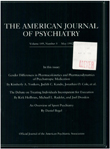A controlled trial of fluvoxamine in obsessive-compulsive disorder: implications for a serotonergic theory
Abstract
Thirty-eight patients with primary obsessive-compulsive disorder participated in a 10-week, double-blind, placebo-controlled trial of the potent, selective serotonin reuptake inhibitor fluvoxamine. Fluvoxamine was significantly better than placebo on two of three measures of improvement in obsessive-compulsive symptoms. The authors also compared studies of the serotonergic agents fluvoxamine, sertraline, fluoxetine, and clomipramine and found that a greater effect size was associated with less serotonergic specificity and that some ability to affect other neurotransmitter systems may be a necessary but not sufficient requirement for antiobsessional activity. These data lend only partial support to a serotonin hypothesis of obsessive-compulsive disorder.
Access content
To read the fulltext, please use one of the options below to sign in or purchase access.- Personal login
- Institutional Login
- Sign in via OpenAthens
- Register for access
-
Please login/register if you wish to pair your device and check access availability.
Not a subscriber?
PsychiatryOnline subscription options offer access to the DSM-5 library, books, journals, CME, and patient resources. This all-in-one virtual library provides psychiatrists and mental health professionals with key resources for diagnosis, treatment, research, and professional development.
Need more help? PsychiatryOnline Customer Service may be reached by emailing [email protected] or by calling 800-368-5777 (in the U.S.) or 703-907-7322 (outside the U.S.).



